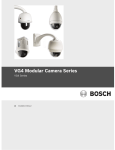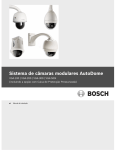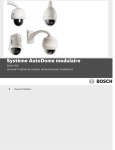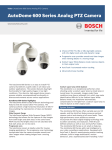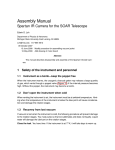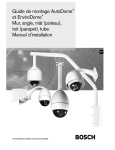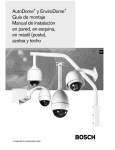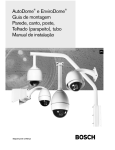Download AutoDome Modular Camera System Reference Guide
Transcript
AutoDome Modular Camera System Reference Guide 2 AutoDome Modular Camera System Contents 4 Introduction 6 How to Select an AutoDome 7 Module Options 16 Choosing the Right AutoDome 18 How to Order an AutoDome Kit 22 Optional Accessories 24 AutoDome Components 25 System Configurations 28 System Dimensions 32 Glossary of Terms 3 4 Introducing the AutoDome Modular Camera System As a pioneer and world leader in video surveillance systems, Bosch leads the way in the development of integrated high-speed pan/tilt dome cameras. With the introduction of the AutoDome Modular Camera System, Bosch has truly redefined the state-of-the-art. AutoDome is a revolutionary new dome camera built around a system of intelligent, interchangeable modules that allow camera functionality to be updated quickly and cost efficiently. AutoDome Modular Camera Systems are designed to meet your security needs – now and in the future. By utilizing common components, it is possible to install a fixed or standard camera system today and update to a more advanced version in the future, without having to replace the entire dome. In addition, AutoDome supports hybrid connectivity, delivering simultaneous analog and TCP/IP operation. AutoDome easily integrates with the entire Bosch security product line, including Allegiant matrix switchers, Divar and DiBos digital recorders, and IP network video solutions like the VIDOS video management system. AutoDome’s innovative design provides significant cost savings. Interchangeable modules simplify camera maintenance, upgrades and even migration from analog to IP video. Remote control, configuration and updates can be performed over the video cable (coax or passive UTP) or over the network (with the optional TCP/IP Communications Module). The Bosch commitment to world-class support begins with a three-year warranty and easy access to technical support. Our international sales organizations are committed to meeting your product, service, and training needs. More options, better quality, more support – only from Bosch. 5 AutoDome Options What to consider when choosing your AutoDome To select the right AutoDome for your application, you simply need to determine which camera type you need for the lighting conditions, whether or not you need PTZ control, what mounting and housing option suits your site requirements, and the communications and power requirements. The following sections cover the major options available for the AutoDome Modular Camera System. 6 How to Select an AutoDome Fixed 100 Series Fixed or PTZ camera? PTZ 200 Series Color Color or Day/Night? Day/Night No 300 Series Yes 500i Series Advanced Intelligence? Any AutoDome can use a conventional analog Coax/UTP or TCP/IP Communications Module. Interchangeable Modules – a “future-proof” investment Bosch delivers unmatched flexibility. Simply replace one of AutoDome’s interchangeable modules and quickly change from fixed to PTZ, from color to Day/Night, or add image stabilization and motion tracking. What modules do I need? Bosch’s modular design makes selecting the right AutoDome camera for your specific application a simple 5-step process: + CPU + camera + housing + communications power supply 7 CPU Module Options The CPU module you choose will determine if your AutoDome operates as a fixed or PTZ dome, as well as the number and type of advanced functions such as privacy masking, motion detection and tracking. There are four CPU module options: 100 Series – provides fixed camera functionality, “hot swap” camera module replacement, pluggable communications module upgrades, and built-in surge suppression. 200 Series – delivers fast 360° per second pan/tilt/zoom speeds, “hot swap” camera module replacement, pluggable communications module upgrades, built-in surge suppression, advanced diagnostics, and multilingual displays. 300 Series – includes all of the features of the 200 Series plus additional presets and tours, cable compensation to extend cabling distances, and third-party protocol support. The 300 Series also supports privacy masking and advanced alarm handling via a built-in rules engine. 500i Series – includes all of the features of the 300 Series plus AutoTrack II motion tracking, digital image stabilization, and video motion detection. 8 Camera Module Options Lighting conditions and mounting locations (e.g. indoor or outdoor) will dictate which AutoDome camera module you select. In addition, the PTZ camera modules contain the pan/tilt/zoom receiver driver electronics.* Color Camera Module – Color cameras are the most popular camera choice for standard indoor lighting conditions. AutoDome is available with a choice of varifocal fixed or high-speed pan/tilt/zoom (PTZ) color cameras. With resolutions up to 540 TVL, AutoDome color cameras offer high resolution and high sensitivity to produce excellent image quality for all types of security applications. Day/Night Camera Module – Day/Night cameras offer the best of both worlds. They produce high-quality color video when light levels are high. At night or when the light levels are low, these cameras switch to monochrome and automatically remove the infrared filter to improve IR sensitivity. AutoDome is available with a choice of varifocal fixed or high-speed pan/tilt/zoom (PTZ) Day/Night cameras with resolutions up to 540TVL. *A 200, 300 or 500i CPU Module and PTZ Camera Module are required to add pan/tilt/zoom functionality to an AutoDome 100 Series dome. 9 Zoom Range – The zoom range determines how close you can get to the subject. AutoDome fixed cameras offer a choice of 5x and 10x zoom capabilities for both color and Day/Night camera modules. PTZ cameras are available with a choice of 18x, 26x or an industry-leading 36x optical zoom lens. An 18x optical zoom is ideal for general viewing indoors or outdoors, while a 26x and 36x optical zoom gets you even closer with more detail while maintaining image clarity. Selected PTZ camera modules also offer 12x digital zoom to further extend the camera’s range. 10 Housing Module Options Bosch offers housing options for both indoor and outdoor applications. All housings have been completely redesigned and are now 15% smaller than those used with the previous generation AutoDome. Tethers have been replaced by hinges, making installation easier and safer. Power, data, and video inputs are protected by built-in surge suppression. What's more, all pendant housings, indoor and outdoor, provide IP66/NEMA 4X protection. The new EnviroDome outdoor housing is made from cast aluminum to offer superior corrosion resistance. A built-in heater/blower allows the EnviroDome to maintain peak performance, whatever the weather may bring. The optional XT "extreme temperature" kit extends the EnviroDome's operational range down to a frigid -76°F (-60°C). 11 All housings feature recessed screws and latches for increased tamper resistance. And now all AutoDome models come equipped with an impact-resistant polycarbonate Rugged Bubble to protect your camera from vandalism. Designed to meet stringent strength standards without compromising optical clarity, the Rugged Bubble can withstand impacts equivalent to a 10 pound (4.5 kilograms) weight dropped from a height of 10 feet (3 meters). AutoDome units are available with your choice of a clear or tinted bubble. The clear bubble offers maximum sensitivity by allowing as much light through as possible. The tinted bubble offers covertness by making it difficult to see the direction the camera is looking from the outside. 12 Communications Module Options The communications module determines the method of communicating video, data and alarm information from the camera to the video control system (e.g. matrix switch, DVR, or IP video management system). AutoDome has two communications module options. 13 Analog Module – supports the transmission of analog signals over coax or UTP media. The built-in UTP (unshielded twisted pair) support allows you to extend cabling distances, simplify installation and reduce cost. Fiber optics is the preferred transmission medium to bridge long distances in hostile electromagnetic environments such as industrial plants, subways and railways. AutoDome Modular Camera Systems are available with an optional bi-directional analog fiber transceiver, which allows both analog video and control signals to be transmitted over a single fiber. Bosch power supplies are available with and without an integrated fiber optic module. Be sure to choose the appropriate power supply for your specific application. Remote control, configuration and upgrades can be performed directly over the video cable (coax, passive UTP, or fiber) when using Bosch’s Bilinx bi-directional communication technology. TCP/IP Module – supports simultaneous streaming of IP video across a local or wide area network, and CVBS video via coaxial cabling to support existing analog equipment. The AutoDome TCP/IP Communications Module enables full camera control, alarm transmission and configuration capabilities and upgrades over the network via a standard web browser. Whether you choose analog coax/UTP/fiber or TCP/IP communications, only a single cable is required for viewing control, alarm transmission, and configuration of any AutoDome camera. 14 Power Supply Module and Mounting Options AutoDome offers a number of flexible power and mounting options to meet your site-specific installation requirements. Integrated Power Supplies Bosch’s integrated power supplies come mounted in an IP66/NEMA 4X enclosure and are suitable for indoor or outdoor use. • Pendant Arm – power supply and integrated pendant arm mount for use with wall, mast, and corner mounts. Available in both 120 and 230VAC versions. • Remote Power Unit – stand-alone power supply unit for use with roof and pipe mounts. Available in both 120 and 230VAC versions. Optional Power Supplies G3A-PSU1-(X) are optional indoor power supplies for connecting multiple domes. They are available in 4, 8 and 16 dome versions. The supply converts 120VAC to 28VAC allowing for longer distance wiring runs than those offered by 24VAC power supplies. Outdoor 15 Roof Corner Pipe In-ceiling Wall Mast Wall Indoor Pipe Mounting Options – These photos show the various mount options available for indoor and outdoor AutoDome systems. Mounting choices are specified within the order number for each individual AutoDome Modular Camera System unit. 16 Choosing the Right AutoDome AutoDome 100 Series Fixed Dome Camera System Standard Features Interchangeable CPU, Camera and Comms Modules Yes Operating Temperature: Indoor Housing EnviroDome Outdoor Housing Protocol Support Up the wire control/configuration Privacy Masking/Sector Blanking -10°C to 50°C (14°F to 122°F) -55°C to 50°C (-67°F to 122°F) N/A Yes, Bilinx No Pre-Positions N/A Guard Tour N/A Remote Fast Address N/A AutoPivot and AutoScaling N/A Cable Compensation Alarm Inputs/Relay Outputs Warranty No N/A 3 Years CPUs – Interchangeable Modules: • Pluggable upgrade to 200, 300 or 500i Series CPU • “Hot-Swap” camera replacement or upgrades • Pluggable Communications Module – Built-in Surge Suppression Cameras Resolution 540 TVL Sensitivity – Color Mode (30 IRE) Day/Night: 0.29 lux F1.4, 1/60 (1/50) shutter, max AGC Sensitivity – Night Mode (30 IRE) Day/Night: 0.12 lux F1.4, 1/60 (1/50) shutter, max AGC Day/Night Lens Optical Zoom Digital Zoom Yes 2.7mm to 13.5mm, f/1.2 5mm to 50mm, f/1.4 5x (Varifocal) 10x (Varifocal) No Housings Indoor Outdoor Ingress Protection In-Ceiling, Pendant Pendant IP66/NEMA 4X (Pendant Housings) IP54 (In-Ceiling Housings) Communications Coax/UTP Bilinx, UTP, Coax Optional Ethernet (TCP/IP) Cat5/Cat6 (UTP) Power Supplies/Mounts Power Supplies: 24VAC 120V, 230VAC Indoor Mounts Outdoor Mounts Yes Yes Wall, Pipe, In-Ceiling Wall, Corner, Mast, Pipe, Flat Roof, Roof (Parapet) Fiber Optics Optional Bi-directional Analog Fiber Transceiver (video and control over a single fiber) * With optional XT “extreme temperature” cold weather kit Yes 17 AutoDome 200 Series PTZ Camera System Yes AutoDome 300 Series Advanced PTZ Camera System Yes AutoDome 500i Series Intelligent PTZ Camera System Yes -10°C to 50°C (14°F to 122°F) -10°C to 50°C (14°F to 122°F) -10°C to 40°C (14°F to 104°F) -60°C to 50°C (-76°F to 122°F) Bosch Biphase, RS232 & 485, Pelco “P” or “D” Yes, Bilinx -60°C to 50°C (-76°F to 122°F)* Bosch Biphase, RS232 & 485, Pelco “P” or “D” Yes, Bilinx -60°C to 50°C (-76°F to 122°F)* Bosch Biphase, RS232 & 485, Pelco “P” or “D” Yes, Bilinx No Yes Yes 64 99 99 1 Preset Tour 2 Preset Tours; 2 Recorded Tours 2 Preset Tours; 2 Recorded Tours Yes Yes Yes Yes Yes Yes No Yes Yes N/A 7/4 7/4 3 Years 3 Years 3 Years – Interchangeable Modules – Fast 360° per second pan/tilt speeds – Advanced Troubleshooting and Diagnostics • Diagnostic LEDs • On-screen diagnostic displays – Built-in Surge Suppression Includes all of the features of the 200 Series plus: – Superior Privacy Masking: • 24 masks • Up to 8 masks per scene – Advanced alarm handling via “Rules” engine Includes all the advanced features of the 300 Series plus: – AutoTrack II – Video Motion Detection – “Virtual Masking” Technology – Digital Image Stabilization 470 TVL up to 540 TVL up to 540 TVL 18x Color: 0.5 lux F1.4, 1/60 (1/50) shutter, max AGC 26x Day/Night: 0.5 lux F1.4, 1/60 (1/50) shutter, max AGC 36x Day/Night: 0.6 lux F1.6, 1/60 (1/50) shutter, max AGC N/A 26x Day/Night: 0.1 lux F1.4, 1/60 (1/50) shutter, max AGC 36x Day/Night: 0.16 lux F1.6, 1/60 (1/50) shutter, max AGC No 4.1mm to 73.8mm, f/1.4 18x No Yes Yes 4.1mm to 73.8mm, f/1.4 3.5mm to 91.0mm, f/1.6 3.4mm to 122.4mm, f/1.6 18x 26x 36x 4.1mm to 73.8mm, f/1.4 3.5mm to 91.0mm, f/1.6 3.4mm to 122.4mm, f/1.6 18x 26x 36x 12x 12x In-Ceiling, Pendant In-Ceiling, Pendant In-Ceiling, Pendant Pendant Pendant Pendant IP66/NEMA 4X (Pendant Housings) IP54 (In-Ceiling Housings) IP66/NEMA 4X (Pendant Housings) IP54 (In-Ceiling Housings) IP66/NEMA 4X (Pendant Housings) IP54 (In-Ceiling Housings) Bilinx, UTP, Coax Bilinx, UTP, Coax Bilinx, UTP, Coax Cat5/Cat6 (UTP) Cat5/Cat6 (UTP) Cat5/Cat6 (UTP) Yes Yes Yes Yes Yes Yes Wall, Pipe, In-Ceiling Wall, Corner, Mast, Pipe, Flat Roof, Roof (Parapet) Wall, Pipe, In-Ceiling Wall, Corner, Mast, Pipe, Flat Roof, Roof (Parapet) Wall, Pipe, In-Ceiling Wall, Corner, Mast, Pipe, Flat Roof, Roof (Parapet) Yes Yes Yes 18 How to Order an AutoDome Kit Use the charts on the following pages to create your order numbers based on the examples shown. AutoDome 100 Series Example: VG4 - 1 6 2 - P C 0 0 P • • • • • • AutoDome 100 Series CPU Day/Night 2.7-13.5mm Fixed NTSC Camera Pendant Enclosure w/ Clear Bubble Coax/UTP Communications Pipe Mount 24VAC 60Hz (no fiber optics) C P E 5 6 VG4 1 6 100 Series Video Format 5 = PAL 6 = NTSC Camera Type 1 = Color (2.7-13.5mm) 2 = Day/Night (2.7-13.5mm) 3 = Color (5-50mm) 4 = Day/Night (5-50mm) 2 P 1 2 3 4 W M C R P 0 E C C T Enclosure C = In-ceiling P = Indoor Pendant E = Outdoor Pendant Bubble C = In-ceiling T = Indoor Pendant Communications S = Standard (Coax/UTP) E = Ethernet (TCP/IP) Application Notes: 0 0 P 0 1 2 F Power4 0 = 24 VAC1 1 = 120 VAC 2 = 230 VAC = No power (used for in-ceiling enclosures) Mount4 W = Wall M = Mast C = Corner R = Roof5 P = Pipe Fiber Optics3,4 = No Fiber F = Fiber2 1) No transformer included. Customer must supply 24VAC, 75W transformer (VG4-A-PSU or equivalent). 2) Fiber option only available on pendant-style housing models. For in-ceiling enclosures an LTC 4628 may be used. Each fiber kit requires an LTC 4629 at the head-end. 3) Fiber option only available on dome equipped with Coax/UTP Communications Modules. 4) Power/Mount/Fiber Optic Kits apply to pendant-style housing models only. 5) Roof mount is affixed to vertical parapet. For flat roof installations, you must order the LTC 9230/01 Flat Roof Adapter Plate. 19 AutoDome 200 Series Example: VG4 - 2 1 1 - C T E • • • • AutoDome 200 Series CPU Color 18x PTZ PAL Camera In-Ceiling Enclosure w/ Tinted Bubble Ethernet Communications Module C P E 1 2 VG4 2 1 1 C 1 200 Series Video Format 1 = PAL 2 = NTSC Camera Type 1 18x Color PTZ W M C R P S E T C T Enclosure C = In-ceiling P = Indoor Pendant E = Outdoor Pendant Bubble C = In-ceiling T = Indoor Pendant Communications S = Standard (Coax/UTP) E = Ethernet (TCP/IP) Application Notes: E 0 1 2 F Power4 0 = 24 VAC1 1 = 120 VAC 2 = 230 VAC = No power (used for in-ceiling enclosures) Mount4 W = Wall M = Mast C = Corner R = Roof5 P = Pipe Fiber Optics3,4 = No Fiber F = Fiber2 1) No transformer included. Customer must supply 24VAC, 75W transformer (VG4-A-PSU or equivalent). 2) Fiber option only available on pendant-style housing models. For in-ceiling enclosures an LTC 4628 may be used. Each fiber kit requires an LTC 4629 at the head-end. 3) Fiber option only available on dome equipped with Coax/UTP Communications Modules. 4) Power/Mount/Fiber Optic Kits apply to pendant-style housing models only. 5) Roof mount is affixed to vertical parapet. For flat roof installations, you must order the LTC 9230/01 Flat Roof Adapter Plate. 20 How to Order an AutoDome Kit AutoDome 300 Series Example: VG4 - 3 2 2 - E C S 1 W F • • • • • • AutoDome 300 Series CPU Day/Night 18x PTZ NTSC Camera EnviroDome Enclosure w/ Clear Bubble Coax/UTP Communications Wall Mount Adapter 120VAC 60Hz w/ integrated Fiber Optics Module C P E 1 2 VG4 3 300 Series Video Format 1 = PAL 2 = NTSC Camera Type 2 = 18x Day/Night PTZ 3 = 26x Day/Night PTZ 4 = 36x Day/Night PTZ 2 2 E 2 3 4 W M C R P S E C C T S 1 W 0 1 2 Enclosure C = In-ceiling P = Indoor Pendant E = Outdoor Pendant Power4 0 = 24 VAC1 1 = 120 VAC 2 = 230 VAC Bubble C = In-ceiling T = Indoor Pendant Mount4 W = Wall M = Mast C = Corner R = Roof5 P = Pipe _ = No mount (used for in-ceiling enclosures) Communications S = Standard (Coax/UTP) E = Ethernet (TCP/IP) F F Fiber Optics3,4 = No Fiber F = Fiber2 Application Notes: 1) No transformer included. Customer must supply 24VAC, 75W transformer (VG4-A-PSU or equivalent). 2) Fiber option only available on pendant-style housing models. For in-ceiling enclosures an LTC 4628 may be used. Each fiber kit requires an LTC 4629 at the head-end. 3) Fiber option only available on dome equipped with Coax/UTP Communications Modules. 4) Power/Mount/Fiber Optic Kits apply to pendant-style housing models only. 5) Roof mount is affixed to vertical parapet. For flat roof installations, you must order the LTC 9230/01 Flat Roof Adapter Plate. 21 AutoDome 500i Series Example: VG4 - 5 2 3 - P T E 1 P • • • • • • AutoDome 500i Series CPU Color/Night 36x PTZ NTSC Camera Pendant Enclosure w/ Tinted Bubble Ethernet Communications Module Pipe Mount Adapter 120VAC 60Hz (no fiber optics) C P E 1 2 VG4 5 500i Series Video Format 1 = PAL 2 = NTSC Camera Type 2 = 18x Day/Night PTZ 3 = 26x Day/Night PTZ 4 = 36x Day/Night PTZ 2 4 P 2 3 4 W M C R P S E T C T E 0 P 0 1 2 Enclosure C = In-ceiling P = Indoor Pendant E = Outdoor Pendant Power4 0 = 24 VAC1 1 = 120 VAC 2 = 230 VAC Bubble C = In-ceiling T = Indoor Pendant Mount4 W = Wall M = Mast C = Corner R = Roof5 P = Pipe _ = No mount (used for in-ceiling enclosures) Communications S = Standard (Coax/UTP) E = Ethernet (TCP/IP) F Fiber Optics3,4 = No Fiber F = Fiber2 Application Notes: 1) No transformer included. Customer must supply 24VAC, 75W transformer (VG4-A-PSU or equivalent). 2) Fiber option only available on pendant-style housing models. For in-ceiling enclosures an LTC 4628 may be used. Each fiber kit requires an LTC 4629 at the head-end. 3) Fiber option only available on dome equipped with Coax/UTP Communications Modules. 4) Power/Mount/Fiber Optic Kits apply to pendant-style housing models only. 5) Roof mount is affixed to vertical parapet. For flat roof installations, you must order the LTC 9230/01 Flat Roof Adapter Plate. 22 Optional Accessories Power Supplies A. Integrated Power Supplies Pendant Arm No Fiber Optics VG4-A-PA1 (120VAC) VG4-A-PA2 (230VAC) VG4-A-PA0 (24VAC–no transformer) With Fiber Optics VG4-A-PA1F (120VAC) VG4-A-PA2F (230VAC) VG4-A-PA0F (24VAC–no transformer) Remote Power Unit No Fiber Optics VG4-A-PSU1 (120VAC) VG4-A-PSU2 (230VAC) With Fiber Optics VG4-A-PSU1F (120VAC) VG4-A-PSU2F (230VAC) VG4-A-PSU0F (24VAC–no transformer) B. Optional Power Supplies G3A-PSU1(X): Optional indoor power supplies for connecting multiple domes. Comes in 4, 8 or 16 dome versions. Supply converts 120VAC into 28VAC allowing for longer distance runs than those offered by 24VAC power supplies. Model G3A-PSU1-4 G3A-PSU1-8 G3A-PSU1-16 Description Supports up to (4) AutoDomes Supports up to (8) AutoDomes Supports up to (16) AutoDomes CTFID Configuration Tool with Bilinx Allows remote control, configuration and updates to be performed over the video cable (requires version 3.0 or higher). Model VP-USB VP-CFGSFT Description USB Configuration Tool USB Configuration Tool with Bilinx Software CD 23 Mounting Options A. Mast (Pole) Mount (for use with Pendant Arm Style Mounts) LTC 9541/01 B. Corner Mount (for use with Pendant Arm Style Mounts) LTC 9542/01 C. Roof (Parapet) Mount VG4-A-9230 D. Flat Roof Adapter Plate LTC 9230/01 (for use with VG4-A-9230 Mount) E. Pipe Mount VG4-A-9543 Bubble Accessories Use the following part numbers to order replacement bubbles for your AutoDome. Replacement Bubbles VG4-SBUB-CCL Ceiling Mount Clear Bubble VG4-SBUB-PCL Pendant Mount Clear Bubble VG4-SBUB-CTI Ceiling Mount Tinted Bubble VG4-SBUB-PTI Pendant Mount Tinted Bubble All bubbles include trim ring. In-ceiling models include both white and charcoal colored rings. In-ceiling Tinted White In-ceiling Charcoal Clear White Pendant Charcoal Clear Tinted 24 AutoDome Components The chart below can be used to determine what components your AutoDome Modular Camera System kit contains. Camera Assembly Power and Mounting Kit Camera CameraAssembly Assembly VG4 CPU 1 2 3 5 Description 100 Series Controller (CPU) 200 Series Controller (CPU) 300 Series Controller (CPU) 500i Series Controller (CPU) Camera Options 1 1 2 1 1 2 2 2 1 3 2 3 1 4 2 4 5 1 6 1 5 2 6 2 5 3 6 3 5 4 6 4 Description Module Part # 18x Color PTZ Camera (PAL) 18x Color PTZ Camera (NTSC) 18x Day/Night PTZ Camera (PAL) 18x Day/Night PTZ Camera (NTSC) 26x Day/Night PTZ Camera (PAL) 26x Day/Night PTZ Camera (NTSC) 36x Day/Night PTZ Camera (PAL) 36x Day/Night PTZ Camera (NTSC) 2.7-13.5mm Color Fixed Camera (PAL) 2.7-13.5mm Color Fixed Camera (NTSC) 2.7-13.5mm Day/Night Fixed Camera (PAL) 2.7-13.5mm Day/Night Fixed Camera (NTSC) 5-50mm Color Fixed Camera (PAL) 5-50mm Color Fixed Camera (NTSC) 5-50mm Day/Night Fixed Camera (PAL) 5-50mm Day/Night Fixed Camera (NTSC) VG4-MCAM-11 VG4-MCAM-21 VG4-MCAM-12 VG4-MCAM-22 VG4-MCAM-13 VG4-MCAM-23 VG4-MCAM-14 VG4-MCAM-24 VG4-MCAM-51 VG4-MCAM-61 VG4-MCAM-52 VG4-MCAM-62 VG4-MCAM-53 VG4-MCAM-63 VG4-MCAM-54 VG4-MCAM-64 Housing Options C C C T P C P T E C E T Comms Options 0 S E Power Mount Options Pendant Power and Mounting Kits 0 0 0 0 0 1 1 1 1 1 2 2 2 2 2 W M C R P W M C R P W M C R P Fiber Options F 1 2 3 Module Part # VG4-MCPU-100 VG4-MCPU-200 VG4-MCPU-300 VG4-MCPU-500 Description Module Part # In-Ceiling Housing with Clear Bubble In-Ceiling Housing with Tinted Bubble Indoor Pendant Housing with Clear Bubble Indoor Pendant Housing with Tinted Bubble Outdoor Pendant Housing with Clear Bubble Outdoor Pendant Housing with Tinted Bubble VG4-MHSG-CC VG4-MHSG-CT VG4-MHSG-PC VG4-MHSG-PT VG4-MHSG-EC VG4-MHSG-ET Description Module Part # Fixed Communications Standard (Coax/UTP) Communications Ethernet (TCP/IP) Communications VG4-MTRN-0 (for use with the 100 Series CPU only) VG4-MTRN-S VG4-MTRN-E Description Module Part # 24 VAC In-Ceiling Assembly 1 24 VAC Pendant Arm (Wall Mount) 1 24 VAC Pendant Arm (Mast Mount) 1 24 VAC Pendant Arm (Corner Mount) 1 24 VAC Pendant Roof Mount 1 24 VAC Pendant Pipe Mount 1 120 VAC Pendant Arm (Wall Mount) 120 VAC Pendant Arm (Mast Mount) 120 VAC Pendant Arm (Corner Mount) 120 VAC Pendant Roof Mount 120 VAC Pendant Pipe Mount 230 VAC Pendant Arm (Wall Mount) 230 VAC Pendant Arm (Mast Mount) 230 VAC Pendant Arm (Corner Mount) 230 VAC Pendant Roof Mount 230 VAC Pendant Pipe Mount (no additional module required) VG4-A-PA0 VG4-A-PA0 + LTC 9541/01 (Mast Adapter Bracket) VG4-A-PA0 + LTC 9542/01 (Corner Adapter Bracket) VG4-A-9230 VG4-A-9543 VG4-A-PA1 VG4-A-PA1 + LTC 9541/01 (Mast Adapter Bracket) VG4-A-PA1 + LTC 9542/01 (Corner Adapter Bracket) VG4-A-PSU1 + VG4-A-9230 VG4-A-PSU1 + VG4-A-9543 VG4-A-PA2 VG4-A-PA2 + LTC 9541/01 (Mast Adapter Bracket) VG4-A-PA2 + LTC 9542/01 (Corner Adapter Bracket) VG4-A-PSU2 + VG4-A-9230 VG4-A-PSU2 + VG4-A-9543 Description Module Part # No Fiber With Fiber2,3 (no additional module required) Add “F” to the end of the Power Supply part number 24 VAC Kits do not include a power transformer. Customer must supply 24 VAC, 75 W transformer (VG2-A-PSU or equivalent). Fiber option only available on domes equipped with Coax/UTP Communications Module. Fiber Optic Module (FOM) is available for pendant-style housings only. For in-ceiling housings, an LTC 4628 may be used. 25 System Configurations Typical digital system using the DiBos recorder AutoDome PTZ Camera AutoDome IP PTZ Camera AutoDome IP PTZ Cameras Dinion Analog Cameras Dinion IP Network Cameras DiBos Digital Recorder RAID-5 Storage Array NET RK WO VIP Series Decoders Local Analog Monitor DiBos IP Recorder DiBos Receiver Workstation Analog Monitors DiBos Hybrid Digital Video Recorder DiBos supports the display and recording of analog cameras as well as MPEG-4 streams from Bosch’s IP video products, including VIP encoders, Dinion IP cameras and AutoDome cameras. DiBos provides built-in Bilinx support, centralized user management and multi-site connectivity to deliver nearly unlimited system scalability. RAID-5 Storage Array 26 System Configurations Typical IP Network Video system using AutoDome IP PTZ Cameras AutoDome IP PTZ Cameras VideoJet Encoder w/ Local Recording VIP Series Decoders K NET R WO Network Video Recorder (NVR) running VIDOS-NVR software RAID-5 Storage Array Analog Monitors VIDOS Video Management Workstation Bosch IP Network Video Solution AutoDome cameras can be equipped with a TCP/IP communications module, providing the ability to run IP and analog simultaneously. AutoDome gives you the flexibility and scalability of IP-based systems, plus compatibility with existing CCTV systems. Bosch IP video products enable you to configure, view and control cameras from anywhere in the world over your network. 27 System Configurations Typical matrix system using the Allegiant (LTC 8600) switcher AutoDome PTZ Cameras Analog Monitors Allegiant Matrix Switch Intuikey Digital Keyboard Fixed Cameras Allegiant Video Matrix The Allegiant Matrix Switcher is the solution for your control center needs – from eight cameras with two monitors to 4,096 cameras with 512 monitors. The Allegiant allows for complete control of the AutoDome line via the universal keyboard. 28 Outdoor System Dimensions Wall Mount Pipe Mount 549.6 21.64 22.9 0.90 86.7 3.42 1-1/2” PIPE WITH NPT THREADS AT BOTH ENDS (NOT INCLUDED) 235.8 9.28 (2) 3/4 INCH CONDUIT OPENINGS 299.4 11.79 224.0 8.82 Side with Power Supply and Trim Skirt 88.9 3.50 188.0 7.40 224.0 8.82 88.9 3.50 Mast Mount 10.2 (4) MOUNTING 0.40 HOLES 58 2.3 175 6.9 374.8 14.75 193 7.6 76.6 R 3.01 Front with Power Supply and Trim Skirt 134.6 5.30 (4) 11.0 MOUNTING HOLES 0.43 ALTERNATE 3/4” CONDUIT OPENINGS Corner Mount 38 1.5 160.0 6.30 184.0 7.25 133.4 5.25 133.4 5.25 178 7.0 203 8.0 Back with Power Supply and Trim Skirt 236 9.3 219.1 8.63 mm in 29 Roof Mount End Cap 152.4 6.0 1-1/2 NPT 10-24 x 5/16 Pan Head Screw Stainless Steel (1 included) 1190.8 46.88 69.9 2.75 Pipe Arm 616 24.25 3/8-18 x 3/4 Hex Head Bolt Stainless Steel (3 included) Mounting Bracket 101.6 Typ 4.0 346.2 13.63 Mounting Surface 10.4 8 x 0.41 976.1 38.43 114.3 4.50 Typ. 88.1 3.47 228.6 9.0 1022.4 40.25 279.4 11.0 Roof Mount Adapter Power Supply for Pipe and Roof Mounts 6.35 Typ 0.25 Ø 10.4 0.41 MOUNTING HOLES (4) 170.0 6.69 11.0 04.3 134.6 5.30 111 Typ 4.37 254 Square 10.00 160.0 6.30 216.4 8.52 16.0 Typ 0.63 279.4 11.00 Hole pattern to match that of Wall Mount, LTC 9230/00 1/2 INCH CONDUIT OPENINGS 3/4 INCH CONDUIT OPENINGS 378 14.88 6.35 0.25 in mm 50.8 2.00 105.0 4.13 30 Indoor System Dimensions Wall Mount Pipe Mount 469.1 18.47 22.6 0.90 86.7 3.42 201.2 7.92 1-1/2 INCH PIPE WITH NPT THREADS AT BOTH ENDS (NOT INCLUDED) 216.4 8.52 88.9 3.50 299.4 11.79 88.9 3.50 Side with Power Supply and Trim Skirt Removed 10.2 (4) MOUNTING HOLES 0.40 188.8 7.40 188.9 7.44 374.8 14.75 76.6 R 3.01 Front with Power Supply and Trim Skirt 134.6 5.30 11.0 (4) MOUNTING HOLES Ø 0.43 ALTERNATE 3/4 INCH CONDUIT OPENINGS 160.0 6.30 184.0 7.25 Back with Power Supply and Trim Skirt 76.6 R 3.01 31 In-Ceiling Mount 3/4 INCH CONDUIT OPENING 201.8 7.94 1.90 0.75 94.1 3.70 204.3 8.04 77.0 R 3.03 Front 176.0 6.93 Side ALTERNATE 3/4 INCH CONDUIT OPENING Top 32 Glossary of AutoDome Terms Address – Each AutoDome has a numerical address in the control system in which it is located. This allows the appropriate dome to be operated. The address may be set locally using the Bilinx Configuration Tool for Imaging Devices (CTFID) or remotely using the Fast Address function (see Fast Address). Advanced Alarm Control (AAC) – AutoDome’s flexible and sophisticated alarm management subsystem that allows “rules” to be created that define which input(s) activate one or more outputs (see Alarm Rule). In its most basic form, a rule could define which input(s) should activate which output(s). In a more complex form, a rule can be programmed to take a specific keyboard command (pre-existing or not) and perform a dome function, or any combination of the above. Advanced Diagnostics – Bosch’s combination of built-in On Screen Displays (OSD) and status LEDs that are used to check critical camera parameters such as internal temperature, input voltage levels, and network connectivity. This allows a technician to quickly determine the source of problems and ensure that the dome is functioning within correct operating limits. Alarm Rule – AutoDome’s alarm management subsystem that uses “if this, do that” rules to perform specific actions when an event occurs. Aperture – The size of the opening in the iris. This controls the amount of light that reaches the CCD Sensor. The larger the F-Stop numbers, the less light reaches the sensor. AutoBlack – A technique of boosting the video signal level to produce a full amplitude video signal even when the scene contrast is less than full range (e.g. glare, fog, mist, etc.). The darkest part of the signal is set to black and the lightest part to white, thus increasing the contrast. AutoDome – Fully integrated, high speed, pan/tilt/zoom camera built into a protective dome housing allowing full and continuous 360° coverage of the scene. Auto Focus – The lens continuously adjusts to the correct focus automatically for the sharpest picture. AutoIris – The lens iris opening is automatically adjusted to allow the correct illumination of the camera sensor. Automatic Gain Control – The electronics that regulate the gain or amplification of the video signal. AutoPan – The camera pans continuously between right and left limit settings. AutoPivot – As the camera tilts through the vertical position, the camera is rotated to maintain the correct orientation of the image. AutoPlayback – This function records the sequence of movements of the AutoDome PTZ for later playback allowing a set pattern to be repeated automatically. This function is often called Guard Tour. AutoScaling – As the camera zooms in to increase the size of objects on the monitor screen, the pan and tilt speeds are reduced so that the relative speed on the screen remains constant for similar joystick control positions. AutoTrack – A patented technology that integrates motion detection into the camera allowing tracking of an object and zooming in to optimize size and perspective. Auto White Balance – A feature that allows a color camera to automatically adjust its output color to give a natural color independent of the lighting used. Back Light Compensation (BLC) – Selectively amplifies parts of the image to compensate for large contrast differences when only a portion of the image is brightly lit (e.g. a person in a sunlit doorway). 33 Balun (Balance Unbalanced) – A device that converts a balanced video signal (e.g. as used on twisted pair) line to an unbalanced signal (e.g. as used on coax). In a balanced line, such as twisted pair, both wires are electrically equal. In an unbalanced line such as coax, one line has different electrical properties than the other. Bilinx – A communications format that allows remote control, configuration and updates to be performed over the video cable (Coax or Passive UTP). Bi-Phase – Pan/Tilt/Zoom protocol for Bosch products. Cable Category – Application and bandwidth rating system for UTP cabling. Categories 1 through 6 are based on EIA/TIA-568-B standards. Category is typically abbreviated CAT. UTP Category 5, 5e, and 6 are used for Ethernet data cabling applications. Ethernet wiring distances are limited to a maximum of 100m (328ft.) when using UTP wiring. Cable Compensation – A technology that prevents image degradation caused by signal losses when transmitting video over long cable lengths. CCD Format – Indicates the size of the camera sensor used. In general, the larger the sensor, the more sensitive the camera and the better the image quality. The format is quoted in inches, e.g. 1/4" or 1/3". Charge Coupled Device (CCD) – The most common type of solid state image sensor used in CCTV cameras. The sensor converts light energy into electrical signals. Color Temperature – A measure of the relative color of illumination. Most generally used to specify the automatic correction range of a color camera. Day/Night (IR sensitive) – An AutoDome that has normal color operation in situations where there is sufficient illumination (day conditions), but where the sensitivity can be increased when there is little light available (night conditions). This is achieved by removing the infrared cut filter required for good color rendition. The sensitivity can be further enhanced by integrating a number of frames to increase the signal to the noise ratio of the camera. Default Shutter – This feature allows the shutter speed to be set to a fast speed to eliminate motion blur and providing detailed and clear image of fast-moving objects while there is sufficient light. When light levels fall and other adjustments have been exhausted, the shutter speed reverts to the standard setting to maintain sensitivity. Digital Image Stabilization – See Image Stabilization. Dynamic Noise Reduction – A digital video processing technique that measures the noise (image artifacts) in the picture and automatically reduces it. Ethernet – The most commonly used local area network (LAN) access method. Ethernet complies with the IEEE 802.3 standard. The Ethernet standard supports 10Mbps, 100Mbps and 1000Mbps (Gigabit) data transmission rates. EnviroDome – AutoDome with environmental protection that allows it to be used outdoors in almost any climate. Fast Address – A system for setting the address of the AutoDome remotely from the control system. 34 Glossary of AutoDome Terms Fiber Optic Transmission – Refers to the transmission of video and/or data via optical fibers. Optical fibers are thin glass strands that are designed for light wave transmission. Video and data are digitized and transformed into a series of light pulses. The use of fiber optics for video and data transmission offers several advantages over sending electrical signals across copper wires. First, light pulses are not affected by random radiation in the environment, and thus their error rate is far lower. Fiber optics span far greater distances without need for repeaters or signal regenerators, and are far more secure as they are more difficult to tap and taps in the line can be detected. Optical fiber also provides enormous bandwidth with a single fiber capable of transmitting trillions of bits per second. There are two primary types of optical fiber; singlemode and multimode. Singlemode fiber is used when large distances must be spanned, typically greater than 2Km/1.2 miles (see Singlemode). Multimode is typically used to span smaller distances such as the inside of buildings or on small campuses (see Multimode). Field of View – The measure of the visible area within the camera’s field of view. The larger the focal length, the smaller the field of view. The smaller the focal length, the wider the field of view. Focal Length – The distance from the optical center of the lens to the image of an object located at an infinite distance from the lens. Long focal lengths give a small field of view (e.g. telephoto effect), while short focal lengths give a wide angle view. F-Number – The standard measure of the lens aperture, which is the iris diameter, divided by the focal length of the lens. The lower the maximum aperture (or F-Number), the more light that passes through the lens. F-Stop – See F-Number. Guard Tour – Allows recorded tours with a combined duration of 15 minutes. Recorded tours consist of control commands and can be played back as needed. All camera position information is stored for maximum flexibility (including pan, tilt, zoom, etc.). Hybrid Streaming – The ability to simultaneously stream IP video across a local or wide area network, and CVBS video via coaxial or fiber optic cabling. Image Stabilization* – An algorithm that virtually eliminates camera shake in both the vertical and horizontal axes, resulting in exceptional image clarity. Infrared Illumination – Electromagnetic radiation (light) with a longer wavelength than is visible to the naked eye. IR illumination is prominent at dusk and dawn and in incandescent lamps. IR illuminators come in the form of lamps with the appropriate filters, LEDs, or lasers. CCD sensors are less sensitive to IR than visible light, but IR can significantly increase the total illumination level, leading to a much better image at low light levels. IP 66 – The IP code (Ingress Protection) indicates the degree of protection provided by enclosures for electrical equipment. The first number indicates protection of internal equipment against the ingress of solid foreign objects. The second number indicates protection of internal equipment against harmful ingress of water. Higher digits refer to higher levels of protection. See also NEMA rating. IP Address – The address of a device attached to an IP network. Each device on an IP network must use a unique address. Every IP data packet contains a source address (sender) and a destination address (recipient). Each IP address consists of 32-bits that are arranged into four 8-bit “octets” (x.x.x.x). IP addresses range from 0.0.0.0 to 255.255.255.255. IPS (Images Per Second) – A measurement of the rate that pictures are displayed to create a video stream. A rate of 25 IPS (PAL) or 30 IPS (NTSC) is generally considered to be full motion video. 35 IRE (Institute of Radio Engineers) – A measurement of video amplitude that divides the area from the bottom of sync to peak white level into 140 equal units. 140 IRE equals 1V peak to peak. The range of active video is 100 IRE. Lux – The International (SI) unit of measurement of the intensity of light. It is equal to the illumination of a surface one meter away from a single candle. MJPEG – Motion JPEG is a digital video encoding standard where each video frame is separately compressed into a JPEG image. Modal Dispersion (sometimes called Intermodal Dispersion) – A broadening of a waveform over long distances. Modal dispersion occurs in multimode fibers, because light is bounced down different reflective paths (e.g. modes) in the fiber. As the distance increases, the path (mode) begins to spread and the arrival time for the different light rays begins to vary. A large variance (dispersion) increases the chance that the optical receiver may interpret the incoming signals incorrectly. Modal dispersion is a major problem with multimode fibers. MPEG-4 – A digital video encoding and compression standard that uses interframe encoding to significantly reduce the size of the video stream being transmitted. With interframe coding, a video sequence is made up of keyframes that contain the entire image. In between the keyframes are delta frames, which are encoded with only the incremental differences. This often provides substantial compression because in many motion sequences, only a small percentage of the pixels are actually different from one frame to another. Multimode Fiber – An optical fiber with a larger core (typically 50 or 62.5 microns) than singlemode fiber. The core can be made of plastic or glass fibers and it is the most commonly used fiber for short distances such as LANs. The name multimode comes from the fact that light rays travel down multiple reflective paths (modes) within the fiber. This allows light to enter the core at different angles, making it easier to connect to broader light sources such as LEDs (light emitting diodes). Fiber optic interfaces and multimode fiber-based transmission systems are less expensive than those based on singlemode fiber. However, the use of multiple reflective paths (modes) increases modal dispersion (see Modal Dispersion) and shortens the distances that this type of fiber optic transmission system can span. Multi-Protocol – A protocol is a convention or standard that controls or enables the connection, communication, and data transfer between two devices. In PTZ cameras such as the AutoDome, protocol refers to the standard used to control the pan, tilt, and zoom (PTZ) operation of the camera. Since each dome camera manufacturer’s PTZ protocols are unique, multi-protocol support is needed to support thirdparty dome systems. AutoDome cameras support the Pelco “D” and “P” protocols and well as Bosch’s own Bi-phase protocol (See Bi-phase). NEMA (National Electrical Manufacturers Association) Rating – Specification standards in reference to the operating environment for a variety of electrical devices. NightSense – A method of boosting the sensitivity of high-resolution Dinion color cameras by 9db (a factor of 3) by combining the signal of the color image in a single monochrome picture. NPT (National Pipe Thread) – A U.S. standard for tapered threads. NPT sizes measure the nominal inside diameter of the pipe. NPT threads form a seal as the threads compress against each other. Pan – Camera movement in the horizontal direction. Pixel (Pix abbreviation of pictures + element) – The smallest addressable unit on a display screen or bitmapped image. Pre-Position – A pre-selected and stored combination of pan, tilt and zoom positions that allow a set view to be recalled. Also known as Preset Shot. Preset Tour – A sequence of preset shots combined to provide a pre-programmed tour of the area covered by an AutoDome camera. 36 Glossary of AutoDome Terms Pressurized Dry Nitrogen Housing – A housing for outdoor applications that protects against smog, humidity, dirt and dust. Privacy Masking – The ability to mask out a specific area to prevent it being viewed. Region of Interest – The defining of a specific area within a field of view to be used by the motion detection algorithm to only look for motion within this region. Resolution – The measure of the fine detail that can be seen in an image. For analog systems this is typically measured in Television Lines or TVL. The higher the TVL rating, the higher the resolution. RS232/485 – A communication interface for third party control and firmware upgrades to the AutoDome products. Sector Blanking – The ability to blank out video in any of the 16 pan sectors. Sensitivity – A measure of the amount of light required to provide a standard video signal. Sensitivity values are stated in lux or foot-candles. SensUp – Increases camera sensitivity by increasing the integration time on the CCD. This is accomplished by integrating the signal from a number of consecutive video frames to reduce signal noise. Singlemode Fiber – An optical fiber with a silica (e.g. glass) core with a diameter of less than 10 microns. Used for high-speed transmission over long distances, it provides greater bandwidth than multimode, but its smaller core makes it more difficult to couple the light source. Singlemode fiber optic transmission systems use more expensive laser-based light sources. Spot Focus – Activates Auto Focus for three seconds after camera movement. Subnet Mask – Subnetting is a method that allows one large network to be broken down into several smaller ones. Depending on the network class (A, B, or C), some number of IP address bits are reserved for the network address (subnet) and some for the host address. For example, Class A addresses use 8 bits for the subnet address and 24 bits for the host portion of the address. Class A subnet masks are denoted 255.0.0.0. Class B addresses (16 bits for both the subnet and host address) use a 255.255.0.0 subnet mask. Class C addresses (8 bits for the subnet and 24 bits for the host address) use a subnet mask of 255.255.255.0. TCP/IP (Transmission Control Protocol/Internet Protocol) – A communications protocol suite that provides two data transport methods. TCP is a connection-based protocol that ensures that data arrives intact and complete. UDP is a connectionless, best effort protocol that simply sends out packets. UDP is typically used for streaming media, while TCP is used when error-free delivery is required. Tilt – Camera movement in the vertical direction. Tri-streaming – A Bosch encoding technology that generates two separate MPEG-4 video streams and one MJPEG stream simultaneously. This advanced streaming capability enables the user to tune live viewing and recording requirements independently to meet specific site and enterprise requirements. UTP (Unshielded Twisted Pair) – A variant of twisted pair cabling UTP cable is not surrounded by any shielding. The wires in a twisted pair cable are twisted around each other to minimize interference from the other twisted pairs in the cable. UTP is the primary wire type for telephone usage and the most commonly used type of networking cable. Virtual Masking – A unique Bosch technology that allows for the creation of “invisible” motion masking areas. These invisible masks are similar to privacy zones, but only the AutoDome’s AutoTrack II and Video Motion Detection algorithms can see them. This allows the AutoDome to ignore areas of unwanted motion. 37 VMD (Video Motion Detection) – An algorithm for motion detection in which the camera compares the current image with a reference image and counts the number of pixels (see Pixel) that have changed between the two images. An alarm is generated when the number of pixel changes exceeds a user-configured threshold. XF-Dynamic – A highly accurate 15-bit digital signal processing technology from Bosch that extends the dynamic range of DinionXF cameras to optimally capture the detail in both the high and low light areas of the scene simultaneously, maximizing the information visible in the picture. Zoom – Changing the effective focal length to allow different fields of view to fill the picture area. Zoom can be optical, where the lens is adjusted, or digital, where a portion of the view selected is magnified electronically. 38 Notes: 39 Notes: A Tradition of Quality and Innovation For over 100 years, the Bosch name has stood for quality and reliability. Bosch is the global supplier of choice for innovative technology, backed by the highest standards for service and support. Bosch Security Systems proudly offers a wide range of security, safety, communications and sound solutions that are relied upon every day in applications around the world, from government facilities and public venues to businesses, schools and homes. Bosch Security Systems To learn more about our product offering, please visit www.boschsecurity.com or send an e-mail to [email protected] © Bosch Security Systems, 2007 Printed in the Netherlands Modifications reserved VS-FP-en-55_F01U518398_02








































